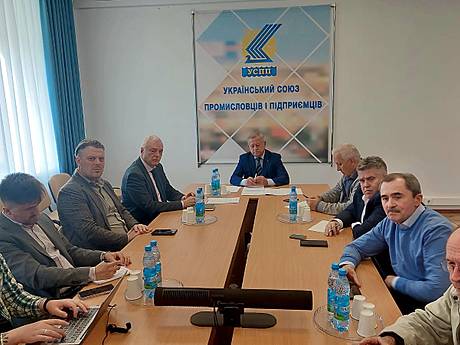
A roundtable discussion on the liberalization of Ukraine’s railway sector and the potential for cooperation with American companies was recently held in Washington and Kyiv.
The event, organized by the Ukrainian League of Industrialists and Entrepreneurs (ULIE), the New Gauge Initiative Foundation, the Ukrainian Recovery Council chaired by Anatoliy Kinakh (which operates as part of the global leadership organization Lives Amplified, based in New York, USA), and the Association of Rail Freight Operators of Ukraine, gathered representatives of Ukrainian and American businesses, multinational corporations, and international investors.
It should be noted that ULIE, together with the Association of Rail Freight Operators, initiated the creation of the Committee on Transport Infrastructure Development under ULIE. This Committee serves as a platform for the development of concrete public-private partnership projects in Ukraine’s railway sector, the attraction of foreign investments, and the promotion of competition.

The roundtable was the first in a series of upcoming presentations of joint international initiatives under the Ukrainian Recovery Council, part of the global Lives Amplified organization. Its core mission is to engage global partners, investors, and thought leaders in long-term projects for Ukraine’s post-war recovery and economic development.
During his address, Anatoliy Kinakh, Head of the ULIE and Chair of the Ukrainian Recovery Council, emphasized that Ukraine has suffered over $600 billion in losses due to Russia’s full-scale invasion. As a result, the country urgently needs comprehensive and systematic recovery plans, expanded industrial capacity, and infrastructure modernization.
"The railway sector is of critical strategic importance. In 2024 alone, Ukrainian Railways (Ukrzaliznytsia) transported 175 million tons of cargo — 70% of all freight in Ukraine. However, the system suffers from severe wear and tear — traction power, rolling stock, and infrastructure urgently need modernization," Kinakh stated.

According to the ULIE President, one of the key objectives is to align Ukraine’s railway infrastructure with international — and especially EU — standards. In this context, the creation of the Transport Infrastructure Committee is only the first step toward deep reform. This involves not just technical upgrades, but also the implementation of principles such as transparency, public financial reporting, demonopolization, and civic oversight.
“It is impossible to modernize the railway system relying solely on the state budget — substantial private investment is needed. That is why we are initiating cooperation with international partners. Joint projects with American businesses can be mutually beneficial,” Kinakh added.
Participants of the event stressed the importance of increased involvement of American companies in infrastructure reconstruction projects and in conducting assessments of Ukraine’s railway system (some of which have already been carried out in partnership with U.S. organizations). Speakers also noted the growing potential for U.S.-Ukraine economic cooperation — the current bilateral trade volume stands at $4.7 billion, four times less than with Poland.

From the U.S. side, the event featured Guy Archer, President of New Gauge Initiative, Matthew London, a research fellow at Georgetown University and former executive at Amsted Rail, and Mark McNamee, Co-founder of UBN Network. Joining them in the Washington studio was Serhii Nenko, President of the Association of Rail Freight Operators of Ukraine and Chair of the Committee on Transport Infrastructure Development.
Pavlo Podolian, a representative of the Association of Rail Freight Operators and Deputy Director for Economics at the Port of Chornomorsk (Ukraine), presented the Concept for the Modernization of Ukrainian Railways (Ukrzaliznytsia). The concept includes:
- amendments to legislation to liberalize the market,
- development of competition in freight transportation,
- conditions for attracting private capital,
- renewal of rolling stock and electrification,
- implementation of modern management and energy-saving systems.

ULIE is already cooperating with international foundations and donors to develop financial models for attracting investments into the sector. As part of the Recovery Council’s work — in coordination with the Transport Infrastructure Committee — pilot projects will be developed that could later evolve into large-scale modernization programs.